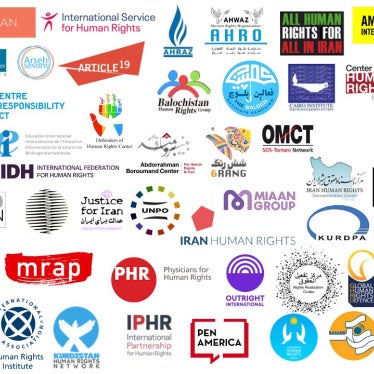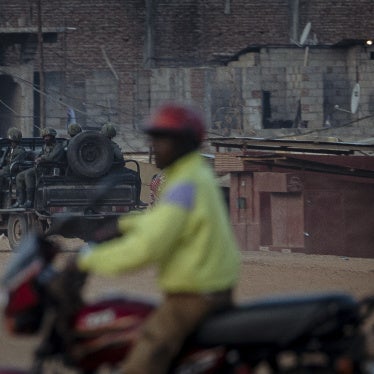I recently traveled to the Bab Al-Salam camp in northwestern Syria, so why couldn’t the aid trucks? My journey from the Turkish border to this makeshift site housing more than 16,000 displaced Syrians took only 10 minutes on foot. Yet, when I arrived at the camp, the absence of basic assistance couldn’t have been clearer.
Children were playing in and around open sewage lines running through the camp. People told me that aid deliveries have been so sparse that, on at least one occasion, children took to stoning the trucks because they didn’t bring enough for everyone. Mothers pleaded with camp managers to help them get milk coupons to feed their babies.
The Bab Al-Salam camp, like three others nearby, is now home for some of the 500,000 people who have been displaced from the northern city of Aleppo since late January as a result of the massive government bombing campaign of opposition-held areas.
This recent influx follows more than two years of conflict that have forced more than 9 million people to leave their homes. More than 3.5 million Syrians in “hard-to-reach” areas need assistance, according to the United Nations, and face shortages like those in Bab Al-Salam. But as my visit underlined, many of these people are only “hard-to-reach” because of arbitrary restrictions imposed by the Syrian government.
Rather than letting aid reach these desperate people from nearby Turkey, Syria has categorically refused to allow aid to come through any border crossings outside of its control, including those in central Turkey.
The Syrian government allows aid to travel to opposition-held areas only when it comes from parts of the country that it holds – not across borders. In practice, this means aid convoys originating in Damascus are forced to travel circuitous routes that can be 10 times as long as more direct routes, across dozens of checkpoints, requiring aid workers to jump through bureaucratic and logistical hoops at every turn.
Occasionally, one of these convoys makes it to its destination, and a trickle of aid is delivered to these “hard-to-reach” people. That fact should not obscure the reality, however, that relying on such deliveries alone is an approach that is designed to fail. They use up scarce resources, expose workers to unnecessary risks, and are ultimately wholly insufficient to supply basic assistance to those in need.
For many months, courageous humanitarian workers have been struggling with limited resources to fill this gap, conducting unofficial aid operations from Turkey. But what I saw in Bab Al-Salam shows the limits of such efforts. Current cross-border operations have extremely limited funding, and face unending bureaucratic hurdles. The UN has scaled up its operations in Turkey and Jordan in part to provide support to such efforts. But UN agencies are not undertaking cross-border operations directly, fearing that challenging Syria on this point would risk operations in the rest of the country.
On February 22, the UN Security Council demanded that “all parties, in particular the Syrian authorities,” promptly allow rapid, safe and unhindered humanitarian access for UN humanitarian agencies and their implementing partners, including across conflict lines and across borders.”
Armed with the Security Council’s commitment that aid needed to reach people in need “through the most direct routes,” UN officials sought access for humanitarian aid through crossings in Turkey and Jordan. Yet Syria’s position remains unchanged. While Syria has agreed to allow convoys at a northern Turkish border crossing that it controls, it steadfastly refuses to discuss access through border crossings on Syria’s northwestern border, the best way of reaching 3.35 million people in Aleppo and Idlib provinces.
This denial flies in the face of Syria’s obligation under the international laws of war to allow and facilitate the “rapid and unimpeded passage” of humanitarian aid to civilians at risk. It flies in the face of common decency and humanity toward civilians caught in the middle.
Following the Security Council resolution, UN agencies should undertake full-fledged operations designed to reach all those in need by the safest and most direct routes possible, including across the Turkish and Jordanian borders. Syria’s allies, including Russia and Iran, should make clear to Syria that both the Security Council resolution and international humanitarian law require it to cooperate with all UN humanitarian operations. Syria should not interfere in any way with the UN’s abilities to provide assistance in either government- or opposition-held territory.
Of course, there are locations in Syria that are indeed “hard-to-reach,” including some that require crossing areas controlled by armed and extremist opposition groups. But hundreds of thousands can receive critically-needed assistance if bureaucratic and political obstacles are overcome. The people of Bab al-Salam are waiting.








